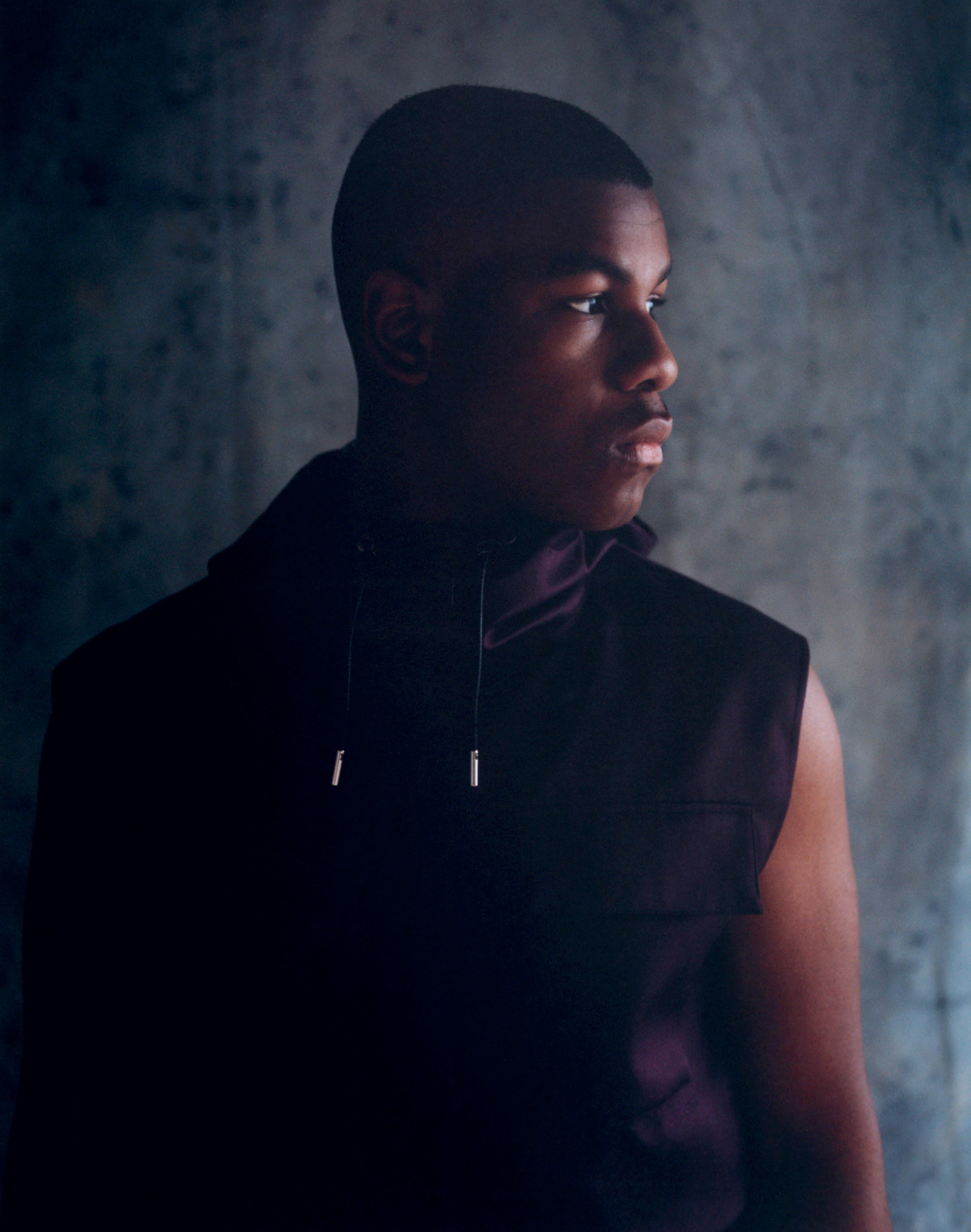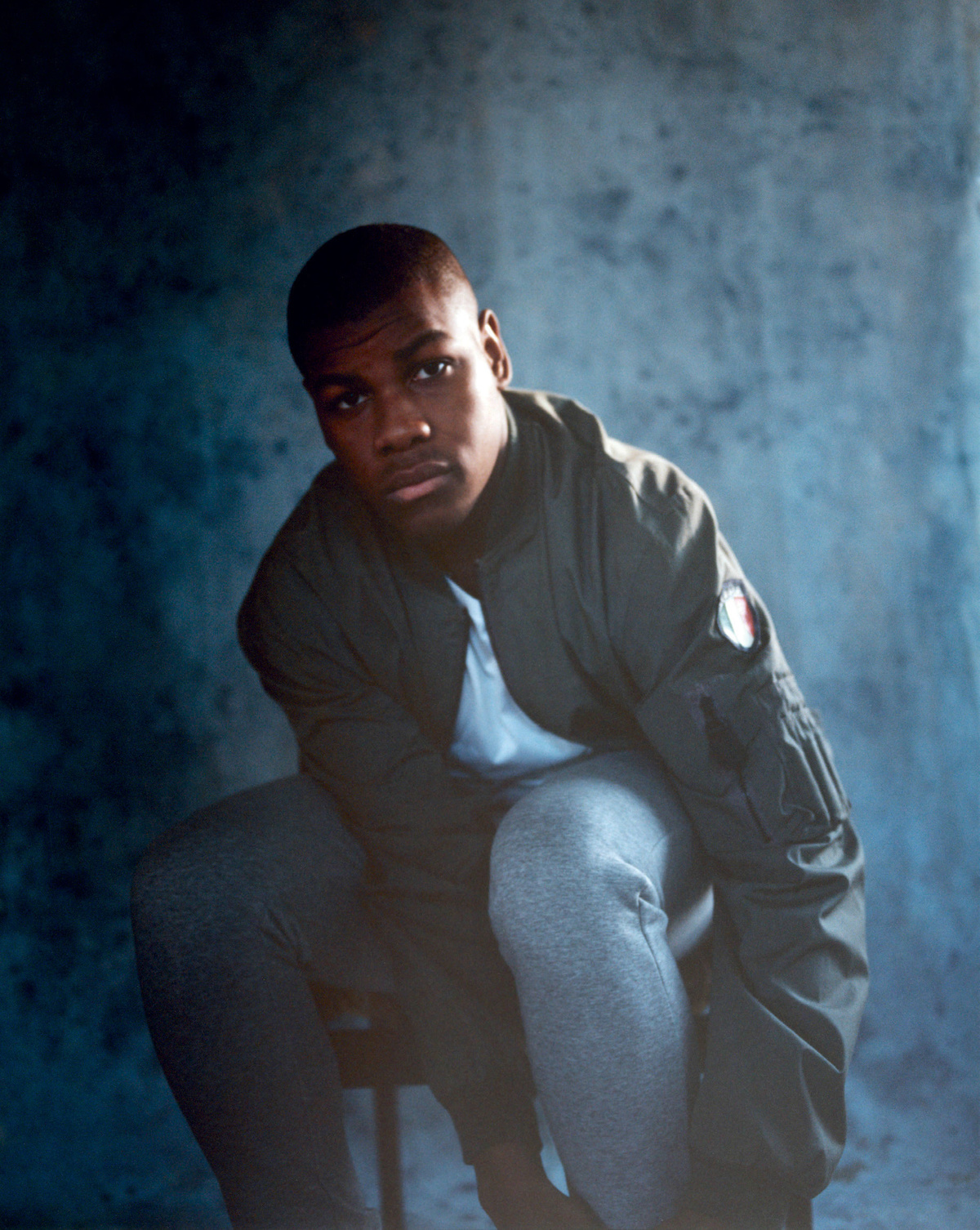John Boyega is sipping an orange juice and comparing the new wave of black stories to the invention of cinematic sound. “Silent films were the norm and that was how it was going to carry on,” he says. “Everyone was happy, nothing was going to change. Then a couple of crazy people said they wanted to transform the narrative basis of cinema by letting you hear the characters. And they did, and it was never the same again.” We’re catching the last of the sun outside a Hackney café. Boyega is as you might imagine from his online presence; open, charming, quick to joke and full of bravado. But when he talks about being a young black man in cinema, in London and in life, it’s clear how deeply he feels it and how much thought has gone into it. “It’s no secret that it’s harder for black people to get their stories out there,” he says of the UK film industry. “I don’t know what they’re thinking, in terms of art, in terms of casting… I find it so weird, having to film in London and it’s all white people. We live in a multicultural city, in a multicultural country, in a multicultural world. Everyone needs to wake up, it’s 2014!” Boyega is still best known on these shores for his debut as the gang-leader Moses in Joe Cornish’s Attack the Block. If I took a straw-poll of the rest of the café, few people could tell you his name or what else he’s done. But Boyega has earnt the right to say these things and be listened to, for his short career has rapidly turned remarkable. In January, Boyega premiered his new film Imperial Dreams at the Sundance Film Festival in Utah, and was heralded as a genuine A-list star. “Another victory lap for this young actor, who’s going to go on to do big, big things,” wrote Indiewire. At Toronto last year, he was singled out for his supporting role in Brixton playwright Biyi Bandale’s Half of a Yellow Sun (released April 11); quite an achievement, given he shares almost all his screen time with Thandie Newton and Chiwetel Ejiofor.
It’s no secret that it’s harder for black people to get their stories out there. I find it so weird. We live in a multicultural city, in a multicultural country, in a multicultural world. Everyone needs to wake up, it’s 2014!

Along with Ejiofor, David Oyelowo and Idris Elba, Boyega is the youngest of a new vanguard of black British actors to push at a long-held status quo; that movies don’t have to naturally reflect the perspectives of the empowered white man. That history is various and multiple, that minorities in society don’t need to be minorities in art. He talks about this pursuit almost as if it were his destiny. Developing a platform for himself to tell these stories is part of a strategy he’s been working on since his early teens. And success was inevitable. “I knew it was going to come, I’m not going to lie,” he says. “Being an actor is number one, but knowing how much is up for grabs is another thing. You aspire to the big jobs, to telling the stories you care about, because they’re there.” His household, he says, was animated and he was privy to conversations not dissimilar to the ones heard in Half of a Yellow Sun, in which he plays a silent and perceptive houseboy, listening in on regal conversations about democracy, freedom and equality as the decade-long Nigerian civil war starts to turn lives upside-down. “It sets a new standard for Nigerian film,” he says, “because there was an actual decision to capture the happy, colourful side of Nigerians but also the conflict and war that took place in Nigeria and between the Nigerian people,” he says. “It’s an important story for me, an opportunity to share my heritage.” But Boyega is not sated with supporting roles. A couple of weeks before we meet, the news broke that he has been cast in a Hollywood biopic of one of the true black icons of the 20th century; he is to play Jesse Owens, the son of an Alabama sharecropper who won four medals in front of Hitler at the 1936 Berlin Olympics. I tell him Jesse Owens will be the biggest part of his career, and he responds as if that’s only just occurred to him. “Yeah,” he laughs, “I reckon you’re right. I haven’t had the chance to sit in the role and just flow with it yet, but yeah, it’s a big deal.” He’s only had the chance to read the script through a couple of times, as he’s about to start filming the London-based return of Fox’s 24 opposite Kiefer Sutherland as Jack Bauer. But when he talks about Jesse Owens, you sense he’s in awe of the man. “He risked his life to go to Germany to run in front of Hitler,” Boyega says. “There were people in America saying he shouldn’t go, that he wasn’t capable of representing the United States. This is thirty years before the Civil Rights movement, and he couldn’t sit down on a bus, or go get some food. Don’t you think about your life? Don’t you think about your new wife and baby at home? I never knew what it took to make a decision like that. Just to run. Just to run. Just. To. Run.” He will have to go on a punishing regime to adopt Owens’ sinewy physicality, but he relishes the process. “It’s going to be a lot of hard work,” he says. “But it’s exactly the kind of story I want to tell.” He pauses, finishes his orange juice and takes in the sun for a second. “But next I want to discover a history before slavery, when black people were running things,” he says. It sounds like he isn’t far off.

Credits
Text Tom Seymour
Photography Olivia Rose
Styling Jack Borkett
Grooming Oonah Anderson using NARS and Bumble and Bumble
Photography Assistance Jay Kirton, Rowan Hall.
Styling assistance Bojana Kozarevic, Kate Iorge
